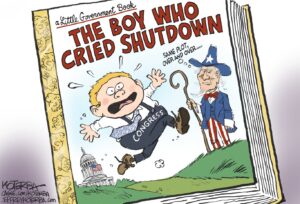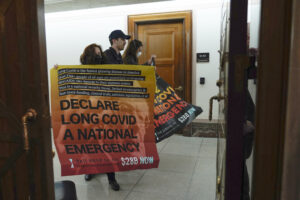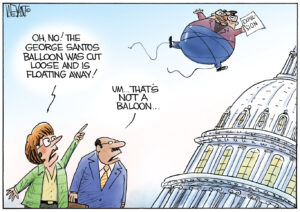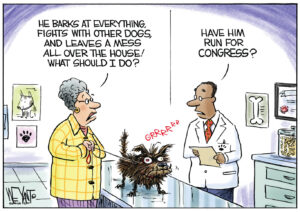Looking for a Middle Class
The challenge of our time is to re-create America as a middle-class nation. [This is Marie Cocco's last column.]
Editor’s note: This is Marie Cocco’s final column. She has written a farewell note below.
The challenge of our time is to re-create America as a middle-class nation.
The idea does not find voice in the cacophony of the 24-hour news cycle. It has no place in the media’s daily digest of gossip, false controversy and ideological cant. It is barely mentioned in the halls of power, where the very officials who capitalize on the economic angst of working people to win election forget that this raw anguish — not the sophisticated arguments of lobbyists and campaign donors — is supposed to motivate them every day.
It is easy to blame the financial crisis, Wall Street’s breathtaking bonuses or the culture of excess that glittered until we found ourselves on the precipice of a second Great Depression. In truth, we’ve been dismantling the economic foundation of the middle class for more than three decades.
How many of you, having previously held a presumptively secure job with a solid company, are now working as a “contractor” or “consultant”? The trend toward taking employees off the payroll only to hire them again as contractors — without health benefits, pensions, sick days, vacations — began in the 1970s with janitors, construction workers and truckers. Now highly skilled technology workers who helped transform the global economy are among the downsized, the outsourced, the contracted-out.
When IBM was an icon of American enterprise, I could not imagine that I would one day follow veteran IBM workers through the halls of Congress as they buttonholed lawmakers. They’d been stripped of their promised pensions and told to make do with a less generous “cash balance” plan that effectively reduced benefits for the most experienced and loyal workers. Nor could I anticipate that after a fatal airline accident we would learn — as we did after the crash of a Continental Connection flight near Buffalo last February — that overworked pilots on regional carriers earn $20,000 a year or less.
No one could have foretold that eight years after 9/11, hundreds of thousands of rescue workers and residents of lower Manhattan would suffer serious, chronic — and often deadly — diseases from their exposure to the hazards at ground zero. Many are unable to work and have lost their health insurance. Others have fought for workers’ compensation in a system that offers none to independent contractors — or to those whose labor was subcontracted to so many companies that no one firm is held responsible. Some are now impoverished.
“While you’re waiting for your workers’ comp, and you’re waiting for your Social Security disability, you have no money,” says John Feal of Long Island, an injured 9/11 construction worker who started a foundation to help others. “You don’t even have gas to get to the doctor.”
They were heroes, we said. But now they are just cogs in a new economy in which business seems to have unilaterally rewritten the rules of the workplace.
Example: Hundreds of companies stopped making contributions to employee 401(k) retirement plans in the wake of the financial crisis. There is no way to force a resumption of funding when the economy rebounds.
The government has abetted all this with decades of hands-off regulation. Example: At current staffing and budget levels, it would take the Occupational Safety and Health Administration 133 years to inspect each workplace under its jurisdiction one time, according to a recent study by the National Employment Law Project.
Soon the political discussion will shift from the need to keep propping up the economy to the need to reduce the deficit and debt. Then we are certain to hear that Social Security and other “entitlements” are the problem and must be curtailed. In fact, Social Security has sufficient funds to pay full benefits through 2037 — a cushion no other government program can claim. Medicare, while under financial strain, has done better at containing costs, per beneficiary, than private health insurers on a similar basis, according to government studies.
The myths that led us to this pass did not materialize by chance. They were conjured up by conservatives intent on dismantling the New Deal society that reigned through the 1960s — a society that produced the world’s most robust middle class. They are fed by lawmakers in both parties who depend on campaign contributions from powerful interests.
Fight the myths. Break the back of the corrupt campaign finance and lobbying systems. These are hard political tasks. But being pushed further down is harder, still. Because no one knows where the new bottom lies.
* * *
This is my final column. Thanks to my loyal readers and dedicated regional editors who have kept a place in their papers and in their minds for the kind of journalism I have worked to provide.
Marie Cocco’s e-mail address is mariecocco(at)washpost.com.
© 2009, Washington Post Writers Group
Your support matters…Independent journalism is under threat and overshadowed by heavily funded mainstream media.
You can help level the playing field. Become a member.
Your tax-deductible contribution keeps us digging beneath the headlines to give you thought-provoking, investigative reporting and analysis that unearths what's really happening- without compromise.
Give today to support our courageous, independent journalists.






You need to be a supporter to comment.
There are currently no responses to this article.
Be the first to respond.